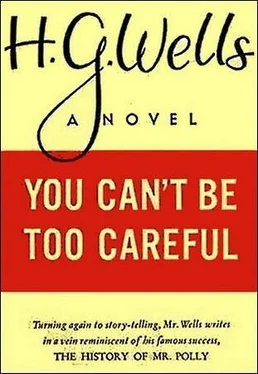H. Wells - You Can't Be Too Careful
Здесь есть возможность читать онлайн «H. Wells - You Can't Be Too Careful» весь текст электронной книги совершенно бесплатно (целиком полную версию без сокращений). В некоторых случаях можно слушать аудио, скачать через торрент в формате fb2 и присутствует краткое содержание. Жанр: Классическая проза, на английском языке. Описание произведения, (предисловие) а так же отзывы посетителей доступны на портале библиотеки ЛибКат.
- Название:You Can't Be Too Careful
- Автор:
- Жанр:
- Год:неизвестен
- ISBN:нет данных
- Рейтинг книги:4 / 5. Голосов: 1
-
Избранное:Добавить в избранное
- Отзывы:
-
Ваша оценка:
- 80
- 1
- 2
- 3
- 4
- 5
You Can't Be Too Careful: краткое содержание, описание и аннотация
Предлагаем к чтению аннотацию, описание, краткое содержание или предисловие (зависит от того, что написал сам автор книги «You Can't Be Too Careful»). Если вы не нашли необходимую информацию о книге — напишите в комментариях, мы постараемся отыскать её.
You Can't Be Too Careful — читать онлайн бесплатно полную книгу (весь текст) целиком
Ниже представлен текст книги, разбитый по страницам. Система сохранения места последней прочитанной страницы, позволяет с удобством читать онлайн бесплатно книгу «You Can't Be Too Careful», без необходимости каждый раз заново искать на чём Вы остановились. Поставьте закладку, и сможете в любой момент перейти на страницу, на которой закончили чтение.
Интервал:
Закладка:
There is-much to be learnt about the psychology of the animal we are, from the fate of these two initiatives. They were caught and crippled and destroyed by the sub-conscious malice of their first generation of disciples. Paul took possession of Jesus and smothered him in doctrinal Christianity, and in a little while that noble beginning had sunken to the wangling of the “Fathers.” It was not the Galilean who triumphed over the pagan stoicism of Julian. It was Paul who conquered. It was the fundamental Tewlerism of mankind that asserted itself against a precocious stirring of Homo sapiens. In the same way Marx imposed an orthodoxy upon the socialist impulse, and infected it with his own conceit, jealousy and arrogance.
Corruptio optima, pessima . To-day the most evil thing in the whole world is the Roman Catholic Church, whose shameless symbol is Jesus the Son of Man, drooping, crucified and done for. Wherever the Catholic priest prevails, among the decadent pious French generals of the surrender, in Croatia, in Japan, in Spain, in that spite-slum, Eire, in Italy, in South America, in Australia, there you find malicious mischief afoot against the enlightenment of mankind. People have called Catholicism a cancer of the human mind. But it is no such neoplasm; it is congenital; it is the organised front of that base heritage of the Tewlers, from which we are seeking Escape. It had no revelation; to claim a revelation is priestly impudence; it is the most natural religion possible, mean and muddle-witted, human to the dregs, pretending to be divine.
The Communist Party is the identical twin of Catholicism. It is its little left brother, psychologically the same. Inevitably the two work together for the same general frustration of human hope. They gratify the same resentful craving of the inferiority complex that we have traced throughout the life of our particular specimen. They arc; the same sort of animal as he. Never shall life be better than my life! they insist.
In view of these two great betrayals, we may reasonably doubt the possibility of a world-wide common education that will raise and keep Homo Tewler above himself. Whatever a few far-seeing people may attempt, it will surely be undermined and defeated by those who will come in and be brought into the great work. “You can’t expect humanity to pull itself up by its own shoe-straps,” tee-hees Mr Chamble Pewter triumphantly. “Forgive my sense of humour.”
But obstinate rebels exist who will not accept that. They argue, for instance, that already there has been at least one drive in this Tewler world, the onset of what it is customary nowadays to call Science with a capital S, which has so far evaded priestcraft or any sort of authoritarian suffocation. This Science has revolutionised the material conditions of human life, and it behoves us to examine how it sprang up and what exactly it is. No miracle begot it. It had no Founder. It began in a natural Adlerian revolt against the overbearing religious dogmatisms of the Middle Ages. Against their exasperating self-confidence, the recalcitrants, unable to take it meekly any longer, and casting about for some means of self-assertion, discovered to their delight certain incompatibilities between the teaching and facts, and summoned a new arbitrator, experimental verification, to justify their revolt. It is absurd to ennoble the driving force of that new movement. We cannot afford to sentimentalise Science; Roger Bacon, so far as our knowledge of him goes, never said, “I love truth,” or “What noble thing can I do for my fellow-men?” or in a state of pious helpfulness, “Let me discover something for the greater glory of God.” He did nothing of the sort; and anyhow the essential thing about him was something quite different; he lost his temper. He endured the philosophical assurance about him as long as he could, and then flung himself at a weak point, abusively and violently, and made the most of it. There was really no essential difference between the motives of Roger Bacon when he put out his tongue at the medieval Aristotle and young Master Edward Albert Tewler when he put out his tongue at the serene self-satisfaction of the lion in the Zoo.
Galileo again, was no visitant from a higher sphere; he was as human as any of us. But the complacent finality of the Church about everything in heaven and earth was too much for him. He published his forbidden book to make those who were set in authority over him realise just what damned fools they were. He could not keep quiet. They argued with him, they made him recant and keep a civil tongue in his bead, but they knew and he knew that they knew. “All the same, it moves,” he jeered at their dignified efforts to nail the earth down again, the earth that Copernicus and he had dislodged and sent spinning off round the sun for ever.
It is very important for our purpose here to recall this essential resentful Tewlerism of the scientific initiative, because then we can realise that great truths can and do emerge and increase without the agency of great minds, exalted discoverers or the like, Through a quite ignoble recalcitrance. It was Tewler insubordinate against Tewler in authority. Scientific progress oozes out of the general substance of Tewlerism, and its outstanding personalities, so liable to deification, are a hindrance rather than a help.
But this does not explain why these new expansions of the human outlook were not presently seized upon and exploited and betrayed by some creed-maker like St Paul, followed up by the usually inevitable priesthood. For that we must account in some other way. It is not so very difficult to do that. Science began differently. It began less as a public teaching than as a hobby. And it did not invade more than a limited part of the field of modern life and thought, and that was a part of the field remote from the primordial scuffle for pride and power. It began completely out of politics, and it raised no objections to current religious and social life. The Royal Society, like the Academia dei Lincei, was a society of gentlemen amateurs who met unobtrusively and exchanged their sceptical observations, their entertaining Centuries of Inventions and so forth, and published their Philosophical Transactions more or less privately. In those days they did not use the word “Science.” It was Natural Philosophy and Natural History they talked about.
The Royal Society was a toy for Charles II, and it was only as the nineteenth century unfolded that mankind realised that this pet tiger cub was growing into a rather formidable monster. It stuck its claws through the gaiters of Bishop Wilberforce with great effect, when he launched a Tewleresque kick at it. It was that memorable encounter of “Soapy Sam” and Grandfather Huxley at the British Association meeting which made the “Conflict of Religion and Science” a fighting issue. Then it was that the great vested interest of Anglicanism, which, in spite of the resistances of nonconformity and dissent, had been selling the Hanoverian Church—and-State system to the variegated population of the British Empire very successfully, took alarm, and the competing nostrum-sellers of Roman Catholicism and the Bible-reading sects, made common cause with it. This young tiger was biting mouthfuls out of the Creator! A Creator was an integral asset in their common equipment; they could not have him eroded and damaged; they could not do without him.
It is plausible to liken Science to a young tiger in this way, but that comparison needs to be qualified. Science may claw or bite upon occasion, but essentially it is the product of a protean anonymous power, and if in certain circumstances it took on the appearance of a dangerous assailant, it eluded any definitive suppression by its extraordinary lack of centralised organisation. It had no head to strike off, no sanctum to burn. There were no consolidated funds to be seized. It arose from the world-wide natural recalcitrance of the human mind. It was here. It was there. Like a dawn. And wherever it spread, the critical spirit in man was stimulated and encouraged to further insubordination.
Читать дальшеИнтервал:
Закладка:
Похожие книги на «You Can't Be Too Careful»
Представляем Вашему вниманию похожие книги на «You Can't Be Too Careful» списком для выбора. Мы отобрали схожую по названию и смыслу литературу в надежде предоставить читателям больше вариантов отыскать новые, интересные, ещё непрочитанные произведения.
Обсуждение, отзывы о книге «You Can't Be Too Careful» и просто собственные мнения читателей. Оставьте ваши комментарии, напишите, что Вы думаете о произведении, его смысле или главных героях. Укажите что конкретно понравилось, а что нет, и почему Вы так считаете.












